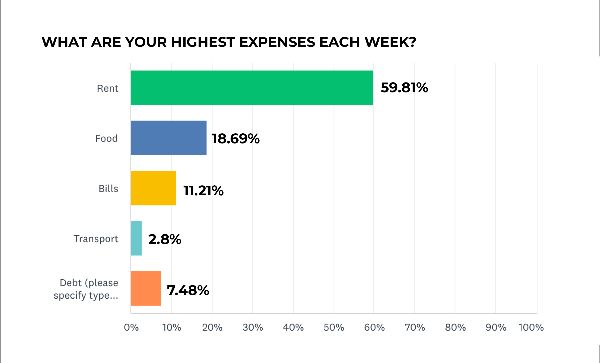In December 2022, Visionwest Waka Whakakitenga – a West Auckland-based community trust working in regions throughout the country to provide wraparound support services to people with a variety of needs – released The One Hundred Whānau Food and Financial Hardship Report.
The Report is based on the responses of 110 client whānau (representing over 400 people) associated with Visionwest who completed an in-depth survey relating to their financial situation with a specific emphasis on food insecurity. This is Part Three of a four-part series based on that report. Part Two can be found here - https://www.scoop.co.nz/stories/PO2302/S00141/food-and-financial-hardship-in-aotearoa-new-zealand-part-two-the-effects-of-food-insecurity.htm
Astrid’s Dilemma
“We can’t afford the doctors. We just don’t go. If it is really serious, we go the hospital because it’s free.” That comment from Astrid about the dilemma she faces when having to carefully apportion the limited amount of spending money her family has at its disposal is one Visionwest social workers hear over and over again.
Yes, it’s true; none of us have unlimited money to spend, and we all have to budget to some extent. However, the sad reality is that many people living in our local neighbourhoods are having to make serious choices between health treatment or paying the power bill; shoes for their children or decent food for their whānau’s dinner.
Kore Hiakai’s (zerohunger.org.nz) 2022 Ka Mākona Report on income inadequacy in Aotearoa New Zealand stated, “Despite benefit and minimum wage increases, most of the households modelled continue to have barely sufficient income to cover their basic fixed household expenses of housing, transport and utilities, basic healthcare and a basic food basket. There is little or nothing remaining to cover the variable costs of essentials such as clothing, insurance, debt repayments, childcare, appliances, school, sport or cultural activities, gifts, and any unexpected expenses.”
The same report compared typical incomes and costs in various localities concluding that, in South Auckland, an adult with two children on a supported living benefit has only $129 a week left after fixed costs – that is, housing costs and utilities.
Where does the money go?
Visionwest’s survey asked whānau to select their highest weekly expense. Answers were predictable.

While the survey does not go into great depth regarding expenditure, it does identify rent as the major expense for 60% of responders. For many, rent arrears is an ongoing cause of concern. Kāinga Ora recently reported that 9,725 of their tenants are in arrears, an 80% increase from the previous year.
For 7.5% of whānau, debt repayment is their single biggest weekly expense. Kore Hiakai research shows that debt repayments of about $110 per week are typical. The alarming thing is, contrary to what is often popular thought, this debt does not usually relate to unaffordable luxury items. It is for basic items such as rent and to pay utility bills.
A better question to ask?
Rather than asking, “Where does the money go?” perhaps a better question to ask is, “What is the money not being spent on?”
The combination of decreased or limited income and the recent rapid rises in the cost of living has meant people have been forced to limit their spending more than ever before, often having to choose between two essential commodities such as food or health.
Impossible choices
Given the level of need evident throughout Visionwest’s One Hundred Whānau Food and Financial Hardship Report, it could be easily assumed that many whānau ignore their regular bills, but this is not so. 32.7% pay all their bills always or often, and another 36.45% do so at least sometimes. The question is, “How does a person do this when they are facing dire financial challenges?”
Whānau facing financial insecurity must make intolerable choices. “Do I buy food this week, or do I pay my outstanding electricity bill?” “Do I go to the dentist or do I replace my child’s worn-out shoes?”
95% of those surveyed report that they worry about finances and it’s no wonder. Possibly the biggest sacrifice of these whānau is their health with 62.6% not going to a doctor when they needed to because the money was required for other things.
The financial irony
If we consider ignoring dental and physical health as an example, it is rather ironic that money for food to keep a whānau healthy is so much cheaper than medical treatments to make them well again. Canadian figures suggest a food-stressed individual will have double the health costs when compared to the rest of the population.
Perhaps it’s time we re-evaluated our social support strategies to consider, not only the cost of benefit payments, but also the huge costs that result from making inadequate payments. More about that in Part Four of this series.
This is Part Three of Visionwest’s commentary on Food and Financial Hardship in Aotearoa New Zealand. Part Four will look to the future and suggest some answers to food insecurity.
You can read the entire Visionwest One Hundred Whānau Food and Financial Hardship Report at https://visionwest.org.nz/about-us/resources-publications/hardship-report/
.



 Plant And Food Research: Creating A New Opportunity From An Invasive Challenge
Plant And Food Research: Creating A New Opportunity From An Invasive Challenge Stats NZ: Total Greenhouse Gas Emissions Fall 0.7 Percent In The September 2024 Quarter
Stats NZ: Total Greenhouse Gas Emissions Fall 0.7 Percent In The September 2024 Quarter Takapuna Beach Business Association: Takapuna Outpaces Auckland With Strong Economic Growth In 2024
Takapuna Beach Business Association: Takapuna Outpaces Auckland With Strong Economic Growth In 2024 Commerce Commission: Bed, Bath And Beyond Sentenced Over Record Number Of Unsafe Products
Commerce Commission: Bed, Bath And Beyond Sentenced Over Record Number Of Unsafe Products GE Free NZ: Minister Reti Asked For Two Week Delay Of Select Committee Deadline
GE Free NZ: Minister Reti Asked For Two Week Delay Of Select Committee Deadline Science Media Centre: Government Plans To Double Mineral Exports By 2035 – Expert Reaction
Science Media Centre: Government Plans To Double Mineral Exports By 2035 – Expert Reaction



